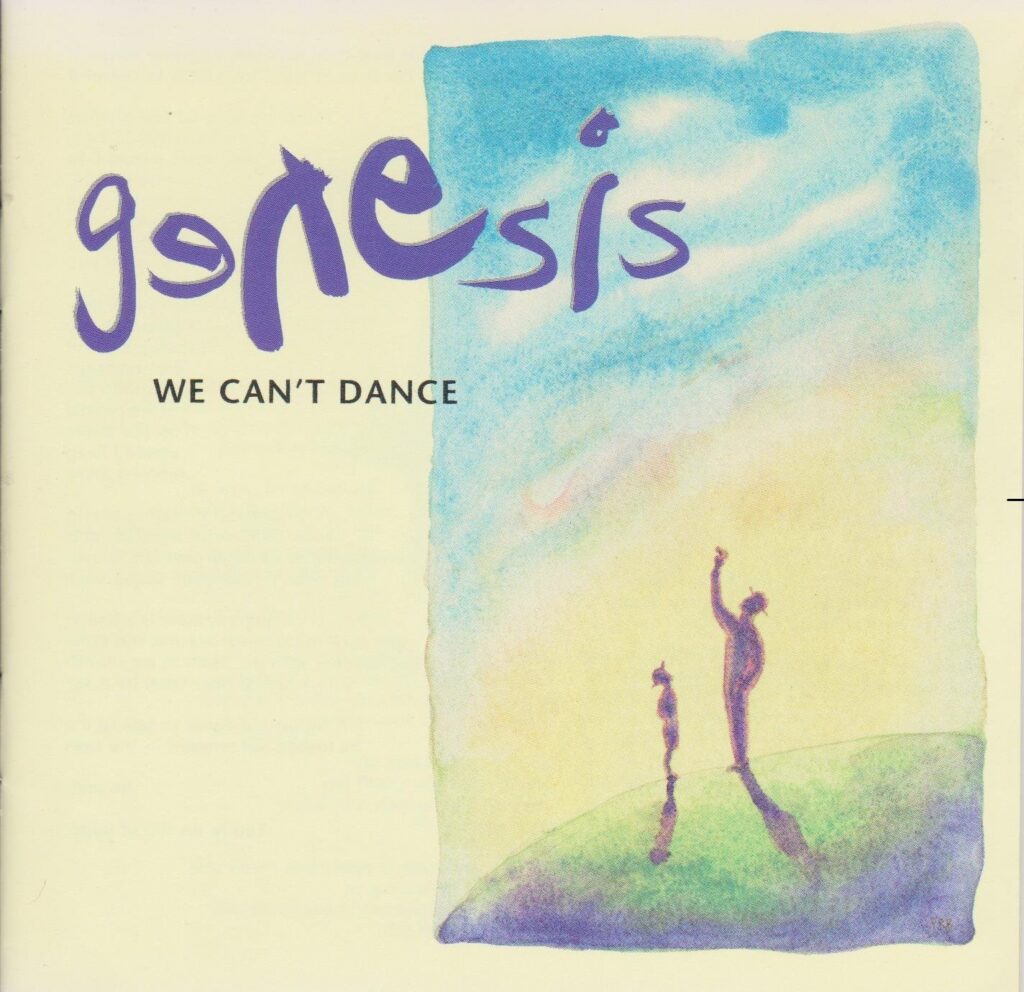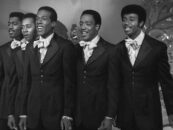 The release of Genesis’ 14th studio album We Can’t Dance in 1991 would be both a watershed moment and finale to the pop-era years of a band that had first redefined prog-rock theatrics and then introduced the music-buying public to the all-encompassing entity known as Phil Collins.
The release of Genesis’ 14th studio album We Can’t Dance in 1991 would be both a watershed moment and finale to the pop-era years of a band that had first redefined prog-rock theatrics and then introduced the music-buying public to the all-encompassing entity known as Phil Collins.
Drummer Collins had by 1991 become a stratospheric superstar, and was coming off his dramatically themed 1989 album …But Seriously. Guitarist Mike Rutherford had fronted his own band, Mike and the Mechanics and had three albums under that moniker. Keyboardist Tony Banks had released his solo album Still in April and, for all intents and purposes, it appeared that the splintering factions of Genesis would not be reforming as a group.
To back up a bit: the group had come off its biggest and longest concert tour, supporting Invisible Touch, released in 1986. During a four-year break, they only performed live twice, in 1988 for the Atlantic Records’ 40th Anniversary concert in New York City and a charity gig at the Knebworth Festival in 1990. However, after the exhaustive toll on the members—especially Rutherford with the death of his father—and more pointedly Collins’ ascent into pop stardom, these circumstances had given notice the three would set aside Genesis and move on.
But Banks, Collins and Rutherford finally reconvened in March 1991, at their private recording studio The Farm in Surrey, England. Contrary to popular belief, the music was born out of group improvisation, which belies any thought that one member dominated over the others (and most of the public would read that as Collins). Each had a hand in the process of writing lyrics and as Collins later elaborated in a press release, “I think they are some of the best lyrics I’ve written, full stop. It’s ironic that that should happen with the band. Obviously, the music stimulated me. I couldn’t write these songs on my own, and so that makes it fun to write them and play them with other people. Genesis occupies another part of me than my solo work.”

Tony Banks, Phil Collins and Mike Rutherford in 2017 (Photo: Patrick Balls Martin Griffin; used with permission)
The relatively new technology of the compact disc would also showcase the durability and portability of the material. In earlier years, Genesis would have blown a gargantuan amount of money and time (which they did) on a double album with a gatefold sleeve and lyrics, buttressed by intricately detailed illustrations. Yet the ability to skip over tracks without lifting the needle or fast-forwarding a cassette endlessly was an intriguing and problematic concept. Would listeners intentionally skip over those 10-minute-long tracks or take in the whole concept as in years past?
In the grand scheme of things, another development in the band’s sound for We Can’t Dance came from the departure of long-time producer Hugh Padgham, who had worked with Genesis since Abacab and on Collins’ four solo albums. His creation of the “gated drum” sound, used so famously on 1981’s “In the Air Tonight” became the template for much of the recorded pop drum sound of the 1980s.
Twenty-eight-year-old Nick Davis stepped into the engineer role as well as co-producing the album with Genesis. Davis, who had worked on solo Banks and Rutherford projects, pushed the band for an organic sound, with Rutherford playing more upfront guitar and Banks utilizing his Hammond organ that had both been downplayed in the previous Genesis releases.
After a six-week summer break, the album was mixed and mastered in September. Ahead of the official drop date of November 11 for We Can’t Dance, the first single and lead-off track “No Son of Mine” was released on October 21. The dark yawning intro for the song, repeated to great effect throughout, was a construct by Banks on the keyboard from a guitar sample by Rutherford. Described by the band as “elephantus,” its prominence underscored the subject matter: the effects of domestic abuse and whether reconciliation is a worthwhile cause. Collins, as the lyricist, kept the narrator vague, declining to say if it was from observed real life or imagined circumstances.
The second single, “I Can’t Dance,” released in December, was another Collins-penned tune. Designed to poke fun at the band’s perceived “unhipness” at the time, its minimalist instrumentation approach, highlighted by Rutherford’s choppy riffs and Collins’ self-deprecating lyrics, were further emphasized in the accompanying video. That video, showing off the fake artifice of glamor, juxtaposed with behind-the-scenes footage and an invented Genesis stutter-step movement, was, to put it mildly, hysterical.
Related: Our interview with Tony Banks
Just prior to the launch of the We Can’t Dance tour, “Hold on My Heart” was released on April 6, 1992. Similar in theme and style to Collins’ 1985 “One More Night,” the ballad hit the head for the category of Adult Contemporary listening. Collins’ delivery is sincere and unruffled and most listeners have now likened it as an underrated gem that deserves more praise than originally given.
“Jesus He Knows Me” was released in July 1992 as the band, including stalwart members Chester Thompson and Daryl Stuermer, was in the middle of the North American leg of its tour. The hard-hitting cynicism of televangelists and the Christian fundamentalist movement was in full-swing during this time period, personified by the likes of Jim Bakker and Jimmy Swaggart. Their reputations were taking a severe beating when allegations arose of their involvement in some not-so-Christian beliefs, including Swaggart’s prostitution scandals and Bakker’s sexual misconduct and fraudulent accounting practices.
The music video is a spot-on send-up of the unscrupulous characters that epitomized Bakker and Swaggart with Banks, Collins and Rutherford comically portraying their roles in one-note fashion for a television audience, showcasing several in-jokes (someone holds up a placard that reads “Genesis 3:25”), and generally roasting the entire sorry scene.
“Driving the Last Spike” was an epic Collins-driven narrative, clocking in at just over 10 minutes, and was a historically themed account of the Navvies, 19th-century British workers who constructed the railway system, and the perils they suffered. This song comes the closest to the days of Peter Gabriel-style storytelling, but isn’t hampered by the multiple prog-time signatures from songs like “Supper’s Ready” or “The Return of the Giant Hogweed.”
“Never a Time” and “Dreaming While You Sleep” are Rutherford-penned lyrics, the former the band’s fifth single, coming off like a standard Collins ballad, despite its sharp vocal clarity. The latter percolates along with a funky synth riff from Banks, while Collins gives off an ominous tone that reads along the lines of his solo “In the Air Tonight,” courtesy of the thundering drumming in the middle eight. And the guitarist’s “Way of the World” swung along with a bass-heavy beat, bearing witness to the cycles of life and death.
Collins’ “Since I Lost You” was another in a long line of regret and loss, written specifically for Eric Clapton on the death of his young son Conor, and the final single release, “Tell Me Why,” was more socio-political commentary from that era’s significant event: the Gulf War and the plight of the Kurdish people, with an upbeat jangling rhythm from Rutherford’s Rickenbacker guitar. As the astute listener could observe and decipher, this as a cousin to Collins’ then recent solo song “Another Day in Paradise.”
Keyboardist Banks’ “Living Forever” was born out the initial jam sessions, hip-hopping along to Collins’ drum machine brush strokes as the lyrics pondered the obsession of fad diets and the promise of living under a healthier, dictator-like lifestyle.
“Fading Lights,” the album’s closer and longest track at 10:16, could be interpreted as the long goodbye to Collins as a member of Genesis. While it wasn’t an avenue that had been publicly acknowledged, the growing consensus—even with a front-facing, unifying press release and the extensive tour afterwards—was that Collins had outgrown the confines of Genesis. And as it happened, this was his last Genesis tour until the 2007 reunion.
We Can’t Dance, released in November 1991, went on to #1 on the U.K.’s Official Charts and #4 on the U.S. Billboard 200. The band took a break after the tour and returned in September 1993 to perform a fundraising concert on the grounds of Cowdray Ruins in West Sussex, England. Collins eventually announced in March 1996 that he was leaving Genesis, to no one’s great surprise. Although Banks and Rutherford managed another album and tour with a replacement singer in 1997, We Can’t Dance remains the classic hitmaking lineup’s last release.
In retrospect, We Can’t Dance is a significant album in Genesis’ discography. It represents the culmination of their pop-rock era, showcasing their ability to craft hit songs with broad appeal. While it may lack the experimental edge of earlier works, it’s an album that continues to resonate with fans for its catchy melodies, emotional depth and polished production.
The album, and others in Genesis’ extensive catalog, are available in the U.S./worldwide here, in Canada here and in the U.K. here.







3 Comments so far
Jump into a conversationPop. Not the Genesis I grew up with. Wind + Wuthering was the end of their greatness; the rest was schlock.
Partial agreement here. ABACAB – very different style, but pretty good. DUKE – pretty downbeat, but Dutchess, for me was the last blast of the old, great Genesis. I liked a couple from the next one, like Tonight, Tonight, Tonight, but much more pop than the old Genesis. Not the same band I once described as being like melodies from a Puccini opera with Phil and Chester Thompson on drums.
And… Return of the Giant Hogweed in no way “hampered” by multiple time signatures!
I was working at a radio station in ’91 and was surprised that “No Son of Mine” was the first single release, as it had a much different feel – musically AND lyrically – than anything on “Invisible Touch”. Really good album, on balance probably better than its predecessor.